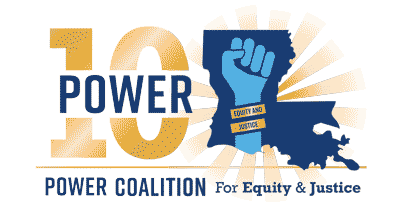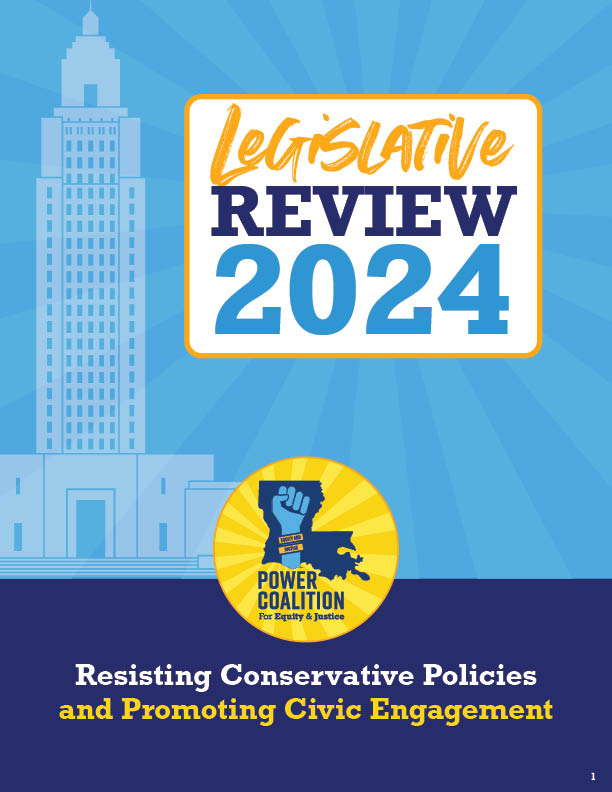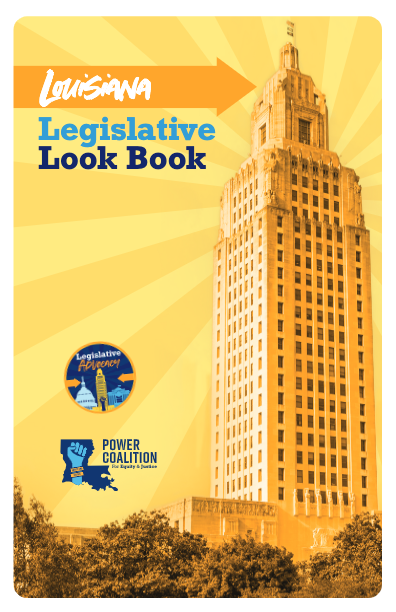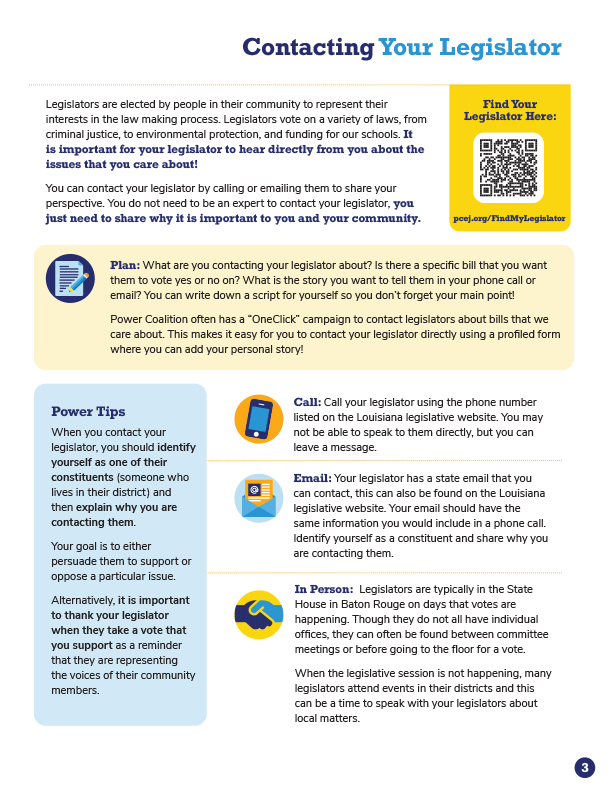2024 Legislative Session
Legislative News
Louisiana’s Special Session Wrap-Up: What You Need to Know
"Feed the Dream"
12/11/2025 8:00 AM - 10:00 AM
230 Renee Dr
Baton Rouge, LA
Sponsor: Power Coalition for Equity and Justice
Click here for more informationMonroe Day of Action
12/13/2025 11:00 AM - 2:00 PM
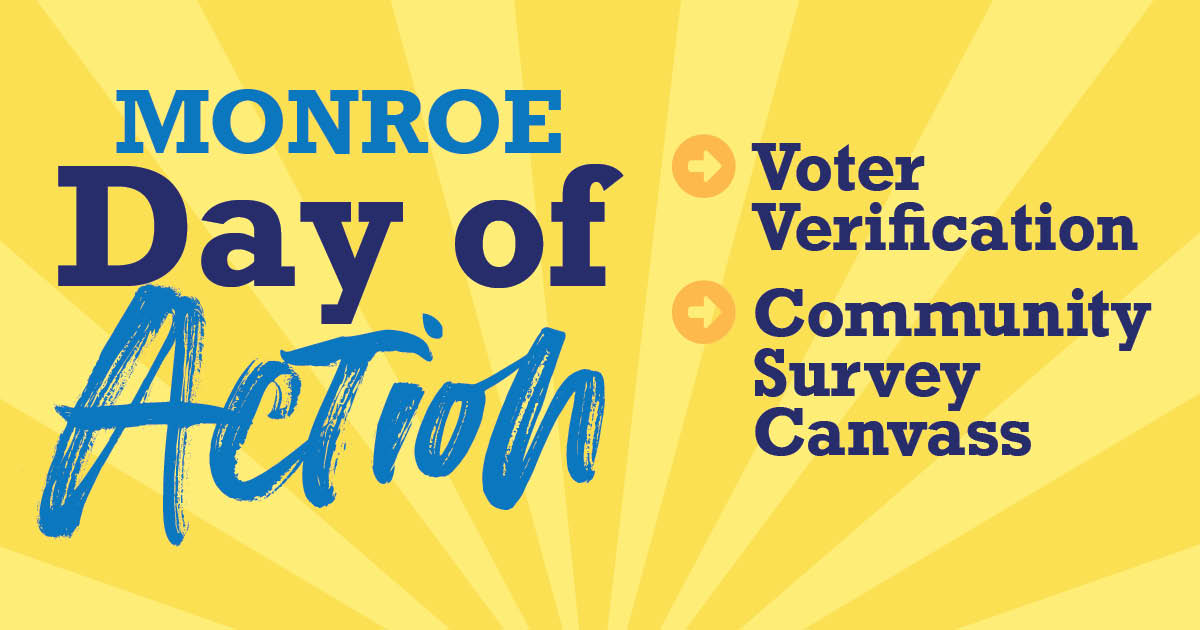
3504 Jackson St
Monroe, LA
Sponsor: Power Coalition for Equity and Justice
Click here for more informationVolunteer with Power Coalition "Feed the Dream"
12/15/2025 10:00 AM - 2:00 PM
16288 Tiger Bend Rd
Baton Rouge, LA
Sponsor: Power Coalition for Equity and Justice
Click here for more informationThe 2025 Louisiana Special Legislative Session has officially ended — and only four measures made it across the finish line: SB 1, SB 2, HR 1, and HCR 3.
While the session was short, the impact of these bills will be felt across our communities — especially when it comes to voting access and fair representation.
This session was intentionally rushed. The Louisiana Legislature changed election dates ahead of the Louisiana v. Callais ruling to position itself to redraw the congressional map before the 2026 elections. This was an intentional move to dilute Black voting power and undo recent gains in representation.
What Passed
SB 1 – Changing 2026 Election Dates
SB 1 shifts several election dates in 2026 — moving the spring elections from April 18 to May 16 and the runoffs from May 30 to June 27. These changes may seem procedural, but they matter: shifting dates can affect voter turnout, registration timelines, and how communities plan outreach and mobilization efforts.
Our take: The Legislature is trying to give itself a window to pass a map that disenfranchises Black voters if the Supreme Court strikes down the current map. This is not just the changing of dates. This is the beginning of a bait and switch on Black voters in Louisiana who finally got a representative map.
SB 2 – New Date for Constitutional Amendment Election
SB 2 also moves the election for proposed constitutional amendments to May 16, 2026, which is the same date as the new spring election. It repeals and revises several earlier acts to align Louisiana’s constitution amendment calendar with the new dates.
Our take: Changing when constitutional amendments appear on the ballot creates voter confusion. Communities deserve clear, transparent communication about what’s on the ballot and when.
SHCR 3 – Urging LDH to Fund SNAP Benefits During Federal Shutdown</h3
HCR 3 urges and requests the Louisiana Department of Health to continue funding SNAP (food assistance) benefits only for the elderly, disabled and children when federal dollars are delayed or unavailable.
Our Take: This resolution acknowledges a real concern — that thousands of families rely on timely SNAP benefits — but it falls short of serving everyone in need. More than 53,000 adults will lose access to food assistance, leaving individuals without the support they depend on.
HR 1 – Urging Congress to Reimburse States for Continuing SNAP Benefits</h3
HR 1 urges the U.S. Congress to authorize reimbursement for states that use their own money (non-federal funds) to continue SNAP (Supplemental Nutrition Assistance Program) benefits during a federal shutdown.
What It Means for Equity & Justice
SB 1 and SB 2, taken together, reflect a trend we’re seeing nationally: big policy impacts hidden in technical or procedural bills.
Election changes can shift who shows up at the polls and whose voices are heard.
At the Power Coalition for Equity & Justice, we believe that every legislative session is a chance to push for transparency, accountability, and equity.
What’s Next
Power Coalition and our partners are already:
- Launching voter education efforts to make sure communities know about the new election dates.
- Preparing to advocate for fair maps and fair elections in any upcoming session when they could be raised.
- Building partnerships to ensure all voters, regardless of race, income, or zip code, have access to information and the ballot box.
Legislative Updates
Weekly Update, June 10
Key Wins for Equity and Justice
Thanks to our collective advocacy, organizing, and partnerships, several meaningful bills advanced that directly align with Power Coalition’s mission:
- HB 100 – Surveillance Reform: Prohibits bail bond agents from using cellular tracking devices.
Status: Sent to Governor - HB 405 – Voting Rights Transparency: Requires the Secretary of State to publicly share changes in election law.
Status: Sent to Governor - HB 457 – Solitary Confinement Reform: Advances protections for incarcerated individuals regarding the use of solitary.
Status: Sent to Governor - HB 454 – Doula Medicaid Coverage: Requires Medicaid coverage for certain doula services, supporting maternal health equity.
Status: Sent to Governor - HB 514 – Doula Registry Board Reform: Restructures the Louisiana Doula Registry Board and provides needed regulatory clarity to improve support for doulas.
Status: Sent to Governor - HB 584 – Back on Track Youth Pilot: Launches a youth development initiative focused on alternatives to incarceration.
Status: Sent to Governor - SB 87 – Cash Bond Notification: Requires notification to those who posted cash bonds when arrest warrants are issued.
Status: Signed by the President - SB 182 – Medicaid Emergency Protections: Ensures continuous Medicaid access during declared emergencies.
Status: Signed by the President
Setbacks and Losses to Monitor
Despite our advocacy, several harmful bills advanced. These signal areas of concern that we’ll need to address in our ongoing work:
- HB 208 – Parole Restrictions: Further limits early release options, disproportionately affecting incarcerated Black Louisianans.
Status: Sent to Governor - HB 260 – Expands Second Degree Murder: Adds resisting arrest with force to the list, raising serious due process concerns.
Status: Sent to Governor - HB 153 – Unemployment Work Search Requirement: Increases weekly job search requirements for unemployment claimants.
Status: Sent to Governor - HB 64 – AG Sovereignty Powers: Grants the Attorney General sweeping authority over legal matters involving the federal government.
Status: Sent to Governor - SB 156 – Embryo Personhood: Recognizes legal rights for in vitro embryos, threatening reproductive freedoms.
Status: Sent to Governor - SB 127 – Nuclear Energy Fast-Track Permitting: Weakens oversight for nuclear energy development.
Status: Sent to Governor - HB 303 – Fugitive Apprehension Unit: Opens door to over-surveillance and targeting of immigrant communities.
Status: Sent to Governor
Emerging Threats and Opportunities
While these bills passed, we’re watching closely to ensure their implementation doesn’t further harm or disenfranchise our communities:
- HB 206 – Legislative authorization before any changes can be made to election procedures that deviate from the current Election Code
- HB 274 – Transfers the state’s emergency office to the Military Department.
- HB 425 – Introduces coerced abortion crime definitions and mandatory reporting.
- SB 4 – Allows political signage at public school sports facilities.
- HB 281 – Prohibits campaign apparel at polling places.
- HB 625 – Statewide Constitutional Amendment Election: Calls for a special statewide election on April 18, 2026, for constitutional amendments.
All currently: Sent to the Governor
Fair Maps Mobilization on October 27, 2025
The Fight for Fair Maps: Louisiana’s Special Session Explained
Cree Matlock Gives Testimony Opposing HB 445
Asti Davis Robins Gives Testimony Opposing SB 275
Learn about what policies Power Coalition and its partners are supporting during the Legislative Session! We encourage the community to attend and see the policy making process live in person; we will also be holding a press conference on the stairs of the Capitol with opportunities to meet legislators.
- Thursday, March 14, 9:00 AM - 3:00 PM
- Lunch Provided
- Sign Up Today! bit.ly/2024PowerDay
Partner Advocacy Days


Prefile Deadline
FRIDAY, MARCH 31
5:00 PM, for all bills that are not general appropriation or local bills

MONDAY, APRIL 10
12:00 PM
January 8-10
Organizational Session
January 15-23
Special Redistricting Session*
February 19 - March 6
Special Public Safety & Crime Session*

March 1
Prefile Deadline for Constitutional Amendments

March 1
Prefile Deadline for Bills
5:00 PM
March 11-June 3
Regular Session
Take Action
Legislative Resources
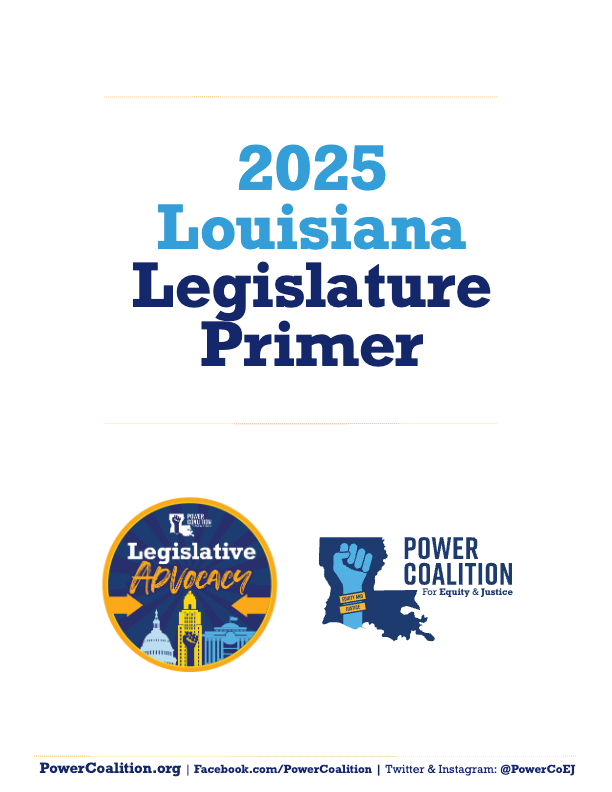
Legislative Updates
Geaux Far Louisiana 2023 Legislative Wins
Geaux Far Lousiana is pleased to share their first Legislative Wins since they launched our bold plan to dream big for little ones and their families.
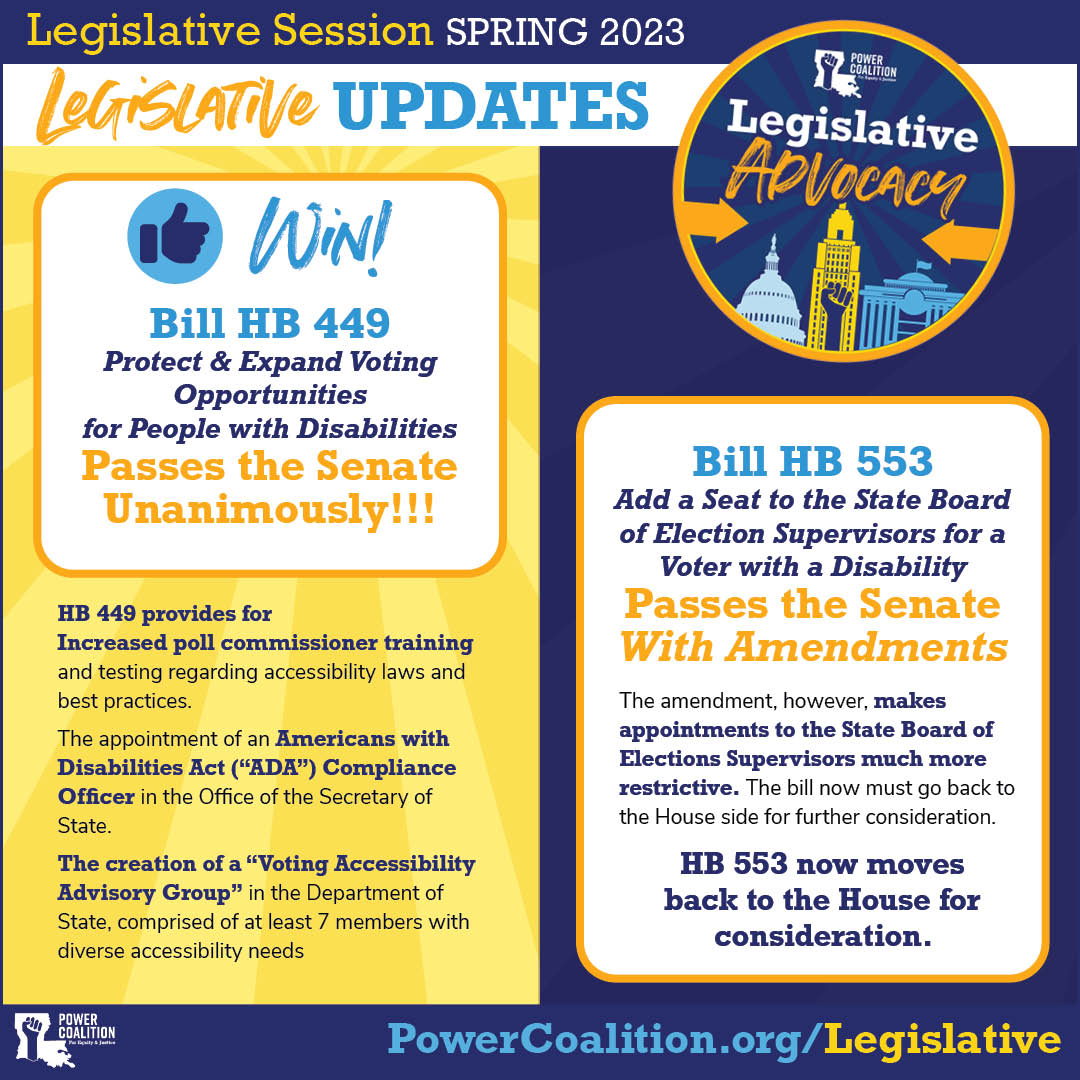
HB 449 provides for Increased poll commissioner training and testing regarding accessibility laws and best practices. The appointment of an Americans with Disabilities Act (“ADA”) Compliance Officer in the Office of the Secretary of State. The creation of a “Voting Accessibility Advisory Group” in the Department of State, comprised of at least 7 members with diverse accessibility needs.
Bill HB 553 would add a seat to the state Board of Election Supervisors for a voter with a disability. It passed the Senate with amendments. The amendment, however, makes appointments to the State Board of Elections Supervisors much more restrictive. The bill now must go back to the House side for further consideration.
Legislative Advocacy
Fair Maps Mobilization on October 27, 2025
The Fight for Fair Maps: Louisiana’s Special Session Explained
Cree Matlock Gives Testimony Opposing HB 445
Asti Davis Robins Gives Testimony Opposing SB 275
Legislative Testimony
Spring Legislative Calendar
Upcoming Events
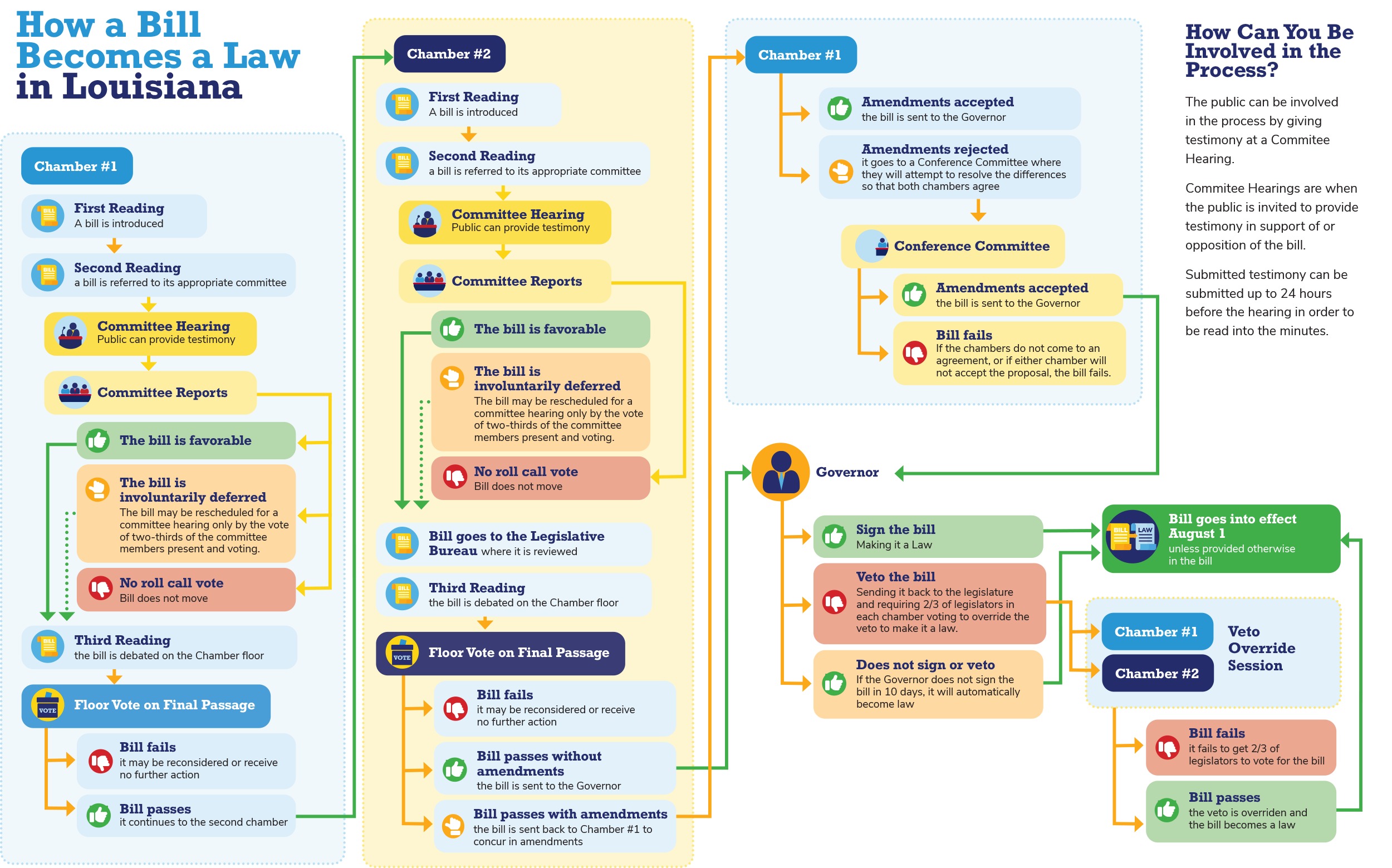
Upcoming Events
Louisiana Legislature's Standing Committees
Senate
Chair: Stewart Cathey Jr.
Vice-Chair: Bill Wheat, Jr.
Members: Robert Allain, Adam Bass, Michael Fesi, Katrina R. Jackson-Andrews, Glen Womack, Eddie Lambert
Chair: Beth Mizell
Vice-Chair: Robert Allain
Members: Mark Abraham, Joseph Bouie, Stewart Cathey Jr., Patrick Connick, Jimmy Harris, John C. “Jay” Morris, Edward Price
Ex Officio: Kirk Tlbot
Chair: Rick Edmonds
Vice-Chair: Valarie Hodges
Members: Jimmy Harris, Katrina R. Jackson-Andrews, Blake Miquez, Beth Mizell, Bob Owen
Chair: Eddie J. Lambert
Vice-Chair: Jeremy Stine
Members: Patrick Connick, Bob Hensgens, Edward J. Price, Brach Jerad Myers, Thomas Pressley
Ex Officio: Stewart Cathey, Jr.
Chair: Glen Womack
Vice-Chair: Heather Cloud
Members: Gerald Boudreaux, Michael “Big Mike” Fesi, Jimmy Harris, Rick Edmonds, Katrina R. Jackson-Andrews, Blake Miquez, Thomas Pressley, Larry Selders, Jeremy Stine
Interim Members: Mark Abraham, Caleb Kleinpeter, Bob Owen
Ex Officio: Franklin J. Foil
Chair: Patrick McMath
Vice-Chair: Katrina R. Jackson-Andrews
Members: Gerald Boudreaux, Heather Cloud, Bob Hensgens, Valarie Hodges, Jay Luneau, Bob Owen, Thomas Pressly
Chair: Kirk Talbot
Vice-Chair: Adam Bass
Members: Regina Barrow, Royce Duplessis, Rick Edmonds, Franklin Foil, Brach Jerad Myers, Alan Seabaugh, Bill Wheat, Jr.
Interim Members: Robert Allain
Ex Officio: Beth Mizell
This committee may also hear bills related to constitutional rights or state boundary lines.
Chair: Gregory Miller
Vice-Chair: Jay Luneau
Members: Gary Carter, Rick Edmonds, Sam Jenkins, Beth Mizell, Alan Seabaugh
This committee may also hear bills related to constitutional rights or state boundary lines.
Chair: Mike Reese
Vice-Chair: Jimmy Harris
Members: Joseph Bouie, Royce Duplessis, Patrick McMath, Kirk Talbot , Bob Owen
This committee may also hear bills related to constitutional rights or state boundary lines.
Chair: Jay Morris
Vice-Chair: Mark Abraham
Members: Regina Barrow, Heather Cloud, Valarie Hodges, Caleb Kleinpeter, Blake Miguez
Chair: Alan Seabaugh
Vice-Chair: Thomas Pressley
Members: Regina Barrow, Brach Jerad Myers, Larry Selders, Jeramy Stine, Kirk Talbot
Chair: Joseph Bouie
Vice-Chair: Gerald Boudreaux
Members: Adam Bass, Stewart Cathey, Jr., Franklin Foil, Gregory Miller, Jay Morris
Chair: Bob Hensgens
Vice-Chair: Michael “Big Mike” Fesi
Members: Robert Allain, Royce Duplessis, Sam Jenkins, Caleb Kleinpeter, Eddie J. Lambert
Ex Officio: Patrick Connick
Chair: Edward J. Price
Vice-Chair: Bob Owen
Members: Gary Carter, Bob Hensgens, Valarie Hodges, Brach Jerad Myers, Kirk Talbot
Chair: Franklin Foil
Vice-Chair: Sam Jenkins
Members: Adam Bass, Joseph Bouie, Patrick Connick, Eddie Lambert, Jay Luneau, Beth Mizell, Jay Morris, Mike Reese, Bill Wheat Jr.
Interim Members: Robert Allain, Gary Carter, Stewart Cathey, Jr.
Ex Officio: Glen Womack
Chair: Caleb Kleinpeter
Vice-Chair: Blake Miguez
Members: Gary Carter, Michael Fesi, Same Jenkins, Gregory Miller, Mike Reese, Larry Selders, Glen Womack
Chair: Patrick Connick
Vice-Chair: Gary Carter
Members: Mark Abraham, Heather Cloud, Patrick McMath, Edward Price, Bill Wheat, Jr., Bob Hensgens
House of Representatives
Chair: Debbie Villio
Vice-Chair: Vanessa LaFleur
Members: Roy Adams, Tony Bacala, Chad Boyer, Vincent Cox, Michael Echols, Bryan Fontenot, Dodie Horton, Alonzo Knox, Pat Moore, Joy Walters, Jeff Wiley
Interim Member: Michael Echols
Ex Officio: Phillip DeVillier, Mike Johnson
Chair: Troy Romero
Vice-Chair: C. Travis Johnson
Members: Beryl Amedée, Larry Bagley, Chad Boyer, Marcus Bryant, Rhonda Butler, Kimberly Coates, Adrian Fisher, Chance Henry, Jacob Landry, Danny McCormick, Wayne McMahen, Rodney Schamerhorn, Vincent St.Blanc, Francis Thompson, Christopher Turner, John Wyble
Ex Officio: Phillip DeVillier, Mike Johnson
Chair: Jack McFarland
Vice-Chair: Jason Hughes
Members: Roy Adams, Beryl Amedee, Larry Bagley, Stephanie Berault, Rhonda Butler, Barbara Carpenter, Dewith Carrier, Kimberly Coates, Jason Dewitt, Adrian Fisher, Aimee Freeman, Barbara Freiberg, Dodie Horton, John Illg, Tim Kerner, Vanessa LaFleur, Rodney Lyons, Shane Mack, Denise Marcelle, Chuck Owen, Tory Romero, Francis Thompson, Jerome Zeringue
Interim Members: Tony Bacala, Christopher Turner
Ex Officio: Phillip DeVillier, Mike Johnson
Chair: Nicky Muscarelleo
Vice-Chair: Chris Turner
Members: Chad Brown, Josh Carlson, Wilford Carter Sr., Emily Chenevert, Kathy Edmonston, Peter F. Egan Sr., Brian Leonard Glorioso, Mike Johnson, Ed Larvadain III, Michael Melerine, Sylvia Elaine Taylor, Lauren Ventrella, Mark Wright, John E. Wyble
Ex Officio: Phillip DeVillier
Chair: Daryl Deshotel
Vice-Chair: Polly Thomas
Members: Delisha Boyd, Kim Carver, Vincent E. Cox III, Paula Davis, Jessica Domangue, Kyle M. Green Jr., Troy Jude Hebert, Stephanie Hilferty, Edmond Jordan, Alonzo L. Knox, Jacob Gabriel Landry, Danny McCormick, Dixon Wallace McMakin, Shaun Raphael Mena, Candace N. Newell, Neil Riser, Vincent “Vinney” St. Blanc III
Ex Officio: Phillip DeVillier, Mike Johnson
Chair: Laurie Schlegel
Vice-Chair: Beryl Amedee
Members: Ken Brass, Josh Carlson, Barbara Carpenter, Kim Carver, Kathy Edmonston, Barbara Reich Freiberg, Michael Melerine, Charles Owen, Vincent “Vinney” St. Blanc III, Phillip Eric Tarver, Sylvia Elaine Taylor, Rashid Armand Young
Ex Officio: Phillip DeVillier, Mike Johnson
Chair: Dustin Miller
Vice-Chair: Rhonda Butler
Members: Stephanie H. Berault, Emily Chenevert, Raymond J. Crews, Kellee Hennessy Dickerson, Michael Charles Echols, Peter F. Egan Sr., Adrian Fisher, Jason Hughes, Steven Jackson, Wayne McMahen, Joseph A. Stagni, Christopher Turner
Chair: Beau Beaullieu
Vice-Chair: Rodney Lyons
Members: Michael Robert Bayham Jr., Beth Anne Billings, Delisha Boyd, Wilford Carter Sr., Les Farnum, Foy Bryan Gadberry, Ed Larvadain III, C. Denise Marcelle, Dixon Wallace McMakin, Candace N. Newell, Rodney Schamerhorn, Polly Thomas, Mark Wright, John E. Wyble
Ex Officio: Phillip DeVillier, Mike Johnson
Chair: Gabe Firment
Vice-Chair: Chad Brown
Members: Larry A. Bagley, Dennis Bamburg Jr., Jacob Braud, Aimee Adatto Freeman, Jack “Jay” William Gallé Jr., Brian Leonard Glorioso, Kyle M. Green Jr., Troy Jude Hebert, Chance Keith Henry, John R. Illg Jr., Mike Johnson, Edmond Jordan, Mandie Landry, Shaun Raphael Mena, Tammy T. Phelps, Roger William Wilder III, Matthew Willard
Ex Officio: Phillip DeVillier
Chair: Robby Carter
Vice-Chair: Kathy Edmonston
Members: Jacob Braud, Chad Brown, Emily Chenevert, Kellee Hennessy Dickerson, Jack “Jay” William Gallé Jr., Kyle M. Green Jr., Troy Jude Hebert, Jason Hughes, Edmond Jordan, Jeremy LaCombe, Vanessa Caston LaFleur, Mandie Landry, Shane Mack, Joseph A. Orgeron, Lauren Ventrella, Jeffrey “Jeff” Fons Wiley, Jerome Zeringue
Ex Officio: Phillip DeVillier, Mike Johnson
Chair: Raymond Crews
Vice-Chair: Dodie Horton
Members: Dennis Bamburg Jr., Tehmi Jahi Chassion, Jason Brian DeWitt, Michael Charles Echols, Brian Leonard Glorioso, Ed Larvadain III, Michael Melerine, Shaun Raphael Mena, Tammy T. Phelps, Phillip Eric Tarver, Joy Walters, Roger William Wilder III
Ex Officio: Phillip DeVillier, Mike Johnson
Chair: Foy Gadberry
Vice-Chair: Barbara Freiberg
Members: Mike Bayham, Beth Billings, Kim Carver, Vincent Cox, Jessica Domangue, Les Farnum, Bryan Fontenot, Steven Jackson, Alonzo Knox, Rodney Lyons, C. Denise Marcelle, Pat Moore, Candace Newell, Chuck Owen, Joe Stagni, Matthew Willard, Rashid Young,
Ex Officio: Phillip DeVillier, Mike Johnson
Chair: Brett Geymann
Vice-Chair: Joe Orgeron
Members: Marcus Bryant, Dewith Carrier, Tehmi Jahi Chassion, Kimberly Coates, Jason DeWitt, Jessica Domangue, C. Travis Johnson, Timothy Kerner, Jeremy LaCombe, Jacob Landry, Shane Mack, Danny McCormick, Neil Riser, Laruen Ventrella, Jerome Zeringue
Ex Officio: Phillip DeVillier, Mike Johnson
Chair: Tony Bacala
Vice-Chair: John Illg
Members: Roy Daryl Adams, Stephanie Berault, Delisha Boyd, Ken Brass, Josh Carlson, Dewith Carrier, Peter Egan, Aimee Freeman, Tim Kerner, Dixon McMakin, Sylvia Taylor, Polly Thomas
Ex Officio: Phillip DeVillier, Mike Johnson
Chair: Ryan Bourriaque
Vice-Chair: Bryan Fontenot
Members: Chad Boyer, Jacob Braud, Tehmi Jahi Chassion, Kellee Dickerson, Steven Jackson, C. Travis Johnson, Pat Moore, Tammy Phelps, Rodney Schamerhorn, Phillip Tarver, Joy Walters, Jeff Wiley
Ex Officio: Phillip DeVillier, Mike Johnson
Chair: Julie Emerson
Vice-Chair: Ken Brass
Members: Dennis Bamburg, Michael Bayham, Jr., Beth Anne Billings, Marcus Bryant, Michael Echols, Les Farnum, Jack “Jay” Gallé, Jr., Chance Henry, Jeremy LaCombe, Mandie Landry, Wayne McMahen, Joesph Orgeron, Roger Wilder, III, Matthew Willard, Rashid Young
Interim Member: Mark Wright
Ex Officio: Phillip DeVillier, Mike Johnson
